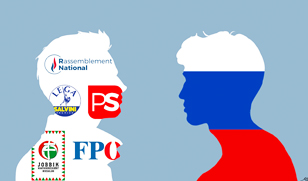 2022 / 26 / Mar
2022 / 26 / Mar
Repercussions of the Russian invasion of Ukraine
On Russia's relations with far-right parties
Theresearcher presented // Khudair Abbas Hussein
Introduction
During the years of his rule, Russian President Vladimir Putin was not reluctant or reserved to build a network of relations and alliance with a right-wing populist extremist in the European Union countries, a policy that was not just a reaction of spitefulness to the European Union, the BA and the West, but rather a systematic and strategic policy aimed at achieving a A geopolitical goal to strengthen Russia's role and influence in the face of the European Unionand NATO. In this brief paper, we will review the most important stations in this relationship and the repercussions of the Russian invasion ofA and Ukraine on this relationship:
1- The relationship between the right-wing European populist parties hostile to immigrants and Muslims and Russian President Vladimir Putin is a relationship whose common denominator is hostility to the European Union and globalization, and this relationship reached the level of alliance and cooperation between the two parties with the aim of achieving common political goals and this alliance was the subject of indignation and anger of European political leaders and European Union institutions targeted, as the Vice President of the European Commission (Frans Timmermans) considered that receiving Russian President Vladimir Putin Marine Le Pen, leader of the French National Rally party, on 24/3/2016 in support of the extreme right aimed at dividing and weakening Europe. Speaking to a committee in the Spanish parliament, he said that "the reason Putin supports the far right in Europe is because he knows that it weakens us and divides us" and that a divided Europe means that Putin is the leader. Therelationship between the Russian president and right-wing populist parties has taken the following paths:
A. Political cooperation and coordination: By inviting leaders and officials of right-wing populist parties to visit Russia and holding meetings and meetings with Russian officials, in May 2013, Bruno Golnich of the French National Rally Party visited Russia, and the former party leader and candidate for the French presidency (Marine Le Pen) visited Moscow, at a rate of a visit every year starting from 2013 and meeting with Russian President (Vladimir Putin) and the Speaker of the State Duma (Sergey Naryshkin). A representative of President Vladimir Putin's party (United Russia) also attended the conference. In December 2013, in which the leaders of right-wing populist parties participated, Russian interest in these parties has many motives, including expanding Russian influence on Western policies and war, weakening NATO, promoting anti-American views, and convincing public opinion in Russia that the Russian leadership has its support in Western Europe. On the referendum annexing Crimea, and in conjunction with the European Union's boycott of the referendum, Russia invited a number of right-wing parties (such as the Italian Northern League, the Belgian Interest Party, the Hungarian Jobik, the Austrian Freedom Party, the French National Rally) to monitor the referendum. This Russian belief has gained great momentum after Britain's exit from the European Union, and the subsequent escalation of far-right calls in more than one European country to hold similar referendums to exit the European Union, and a civil society organization based in Brussels, which is loyal to the Russian president, invited far-right parties to monitor the referendum that was held on 16/3/2014 in Crimea, and representatives of these parties announced that the referendum was free and fair.
B. Financial Support The relationship between the French National Rally Party and the Russian president included the overlap of the money element in the equation of Russian support for European right-wing forces, as the party obtained in 2014 a loan of 9 million euros to finance its activities from the Russian-Czech bank based in Moscow, according to the website of the "Voice of Russia" on November 23, 2014. A Reuters report on December 22, 2016, reported that the party had asked Russia for a loan of 27 One million euros to finance the party's participation in the presidential and legislative elections during the year (2017)
c. Russian media support for members of the extreme right, hosted by far-right leaders (Nigel Farage, leader of the British Independence Party, Geert Wilders, leader of the Dutch Freedom Party, and Marine Le Pen, leader of the French National Front party) in the Russian media.
D. The ideological convergence of the far-right populist forces that share the ideas and visions on which Vladimir Putin's Russia is based, including strengthening national identity and conservative societal values, criticizing the European Union and US policies, restricting immigration as a mechanism to confront "Islamic radicalism", and questioning the values and foundations on which liberalism was founded due to the economic and social crises that led to it. In Europe, right-wing populist parties view Putin as a model of a strong person. Le Pen expressed her admiration for the Russian president because he represents a model of "protectionism, concern for the interests of his state, and defense of its identity in the face of globalization and its repercussions.
e. Russia hosted in February 2015 a conference of forces of extreme right-wing populist parties, with the aim of coordinating positions, and it is ironic that this conference was held in St. Petersburg and the efforts of Russian parties and personalities failed to obstruct the holding of the conference, which was entitled (Russian International Forum of Conservative Forces), attended by a number of Russian parliamentary and political figures, such as the politician (Dmitry Rogozin), one of the symbols of the Russian nationalist (Rodina-Homeland) movement, and was Russia's representative to NATO for years, and after the announcement of the Joint Standing Committee for Coordination, The next conference was held in 2017 in Moscow.
2. The repercussions of the Russian invasion of Ukraine on the relationship between the Russianpresidentand right-wing populist parties
Russia's invasion of Ukraine has placed European right-wing populist parties and movements in a narrow and critical corner between their relations and ideological affinity with Russian President Vladimir Putin, their declared solidarity with Ukraine, and accusations of the West for causing the conflict between Russia and its neighbor Ukraine. Leaders of right-wing populist parties across the European Union, from Germany to France to Italy, Austria and Spain, have made clear their condemnation of the Russian invasion, which NATO leaders refer to as "Putin's war." In France, the leader of the French National Rally, Marine Le Pen, denounced an "indefensive" violation of international law. In Italy, Matteo Salvini, leader of the Northern League party, declared that "when a party is attacked, it is clear that we should stand by the one who is attacked." Far-right Eric Zemmour, who in 2018 called for a "French Putin," believes that "the culprit is Putin, and the culprit is the Atlantic Alliance, which has not stopped expanding." Hayo Funke, a professor of political science at the Free University of Berlin, noted that these populist formations have once taken a position that corresponds to that of other parties, and in particular in line with the "enormous solidarity" shown by public opinion around the world towards Ukrainians. However, this consensus stops at entering into an analysis of the responsibilities behind the outbreak of conflict.
In Germany, the leader of the AfD's parliamentary bloc, Alice Weidel, denounced the West's "historic failure", accusing it of waving to Ukraine the prospect of joining NATO rather than calling for a solution in the country based on "neutrality." This approach, she said, is due to denying "Russia's status as a major power."
For his part, the leader of the nationalist Greek Solution party, Kyriakos Philopoulos, said that if Russia was not threatened, "then what is NATO doing on its borders?" The leader of the Dutch Forum for Democracy, Thier Bodet, said that "Russia had no choice in his opinion," drawing condemnation from other parties that accused him of transmitting "Russian propaganda". Those who once had close ties with Putin, or at least shared his illiberal values and supported the "strongman" culture he embodies, are finding it difficult to distance from him today.
Facing criticism from a photo of a meeting with the Russian president contained in her campaign leaflets printed some time ago, Le Pen said Putin today was not the same as the one he received in Moscow in 2017. Funke told AFP that "the European far-right is in a dilemma between its radical ideology and the neofascism it shares with Putin" and the risk of its "influence" in public opinion diminishing. The challenge is particularly difficult for Zalmour and Le Pen, who together have about a third of their vote intentions in April's presidential election, while support for the Alternative for Germany (AfD) has fallen below 10 percent, according to a recent poll.
In the immigration file, these parties fell into a dilemma and embarrassment because they are among the most opposed parties to immigration, such as the National Rally, the Alternative for Germany, the Spanish ultra-nationalist organization "Vox" and part of the Austrian Freedom Party, and were forced to make concessions and agree to receive Ukrainian refugees fleeing the battles and continue their extremism and opposition to receiving refugees of other nationalities, especially Muslims.
Conclusion
Our assessment is that the Russian invasion dealt a severe blow to the relationship between the Russian president and the right-wing parties that lost a strong ally they werecounting on a lot, as well as These parties will lose much of their credit, which is already decreasing due to their contradictory positions on migrants and the preference for certain nationalities over others, and the Russian invasion represents a warning bell to moderate political forces in the European Union that the far right represents a serious security challenge that threatens the institutions of the European Union.

Khudair Abbas Hussain